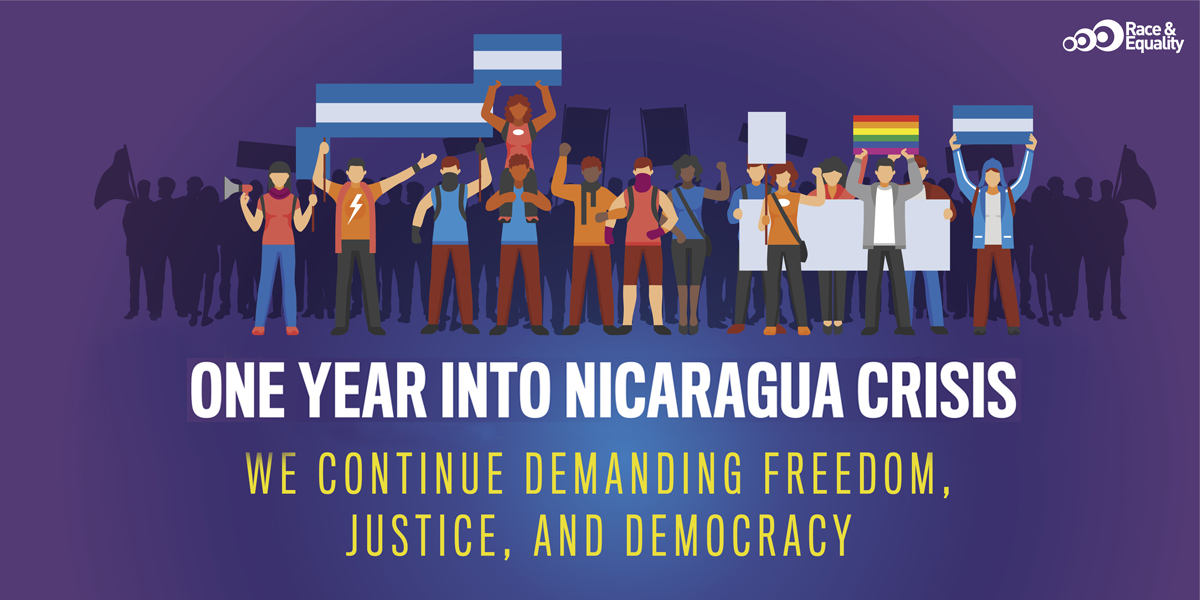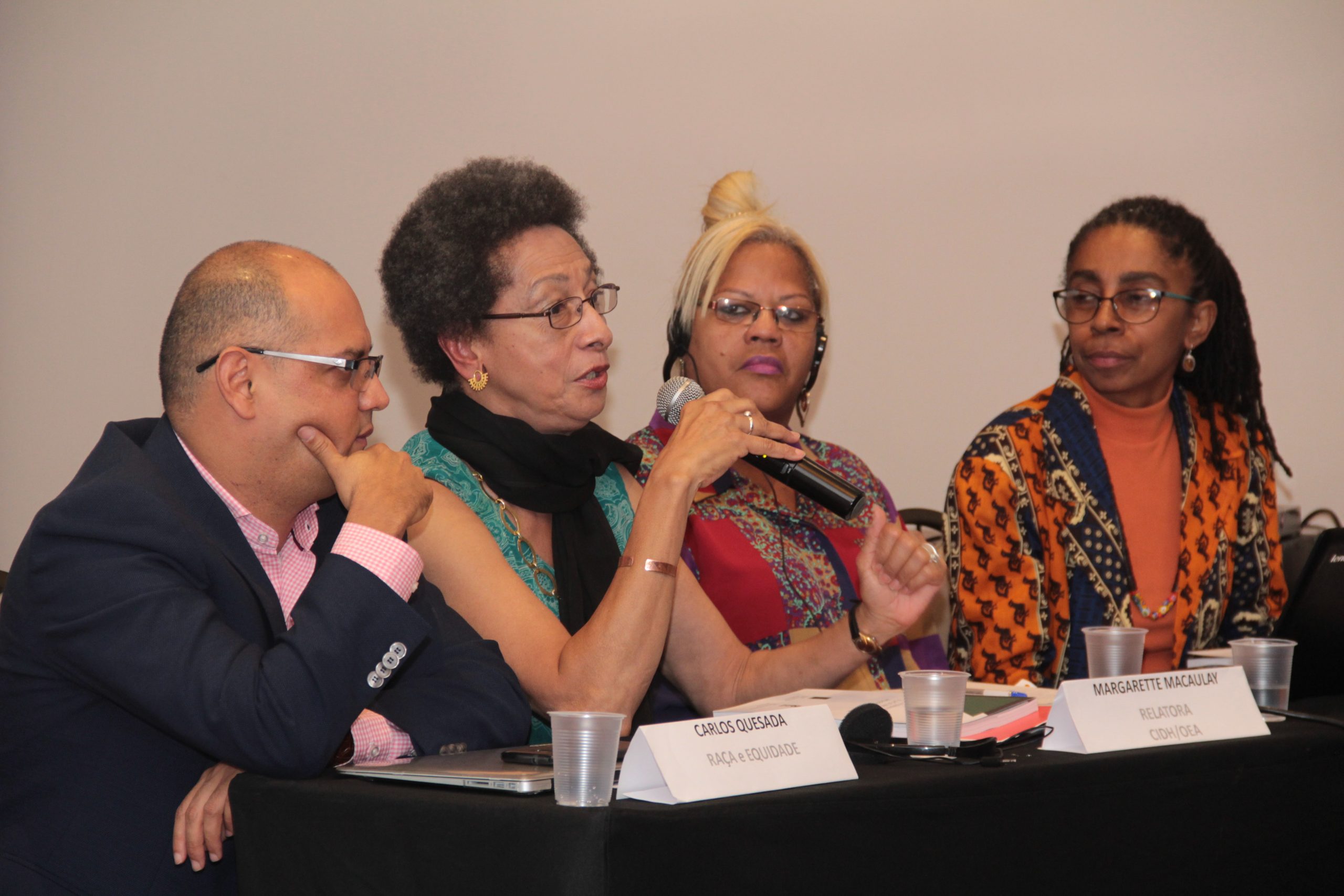We continue demanding freedom, justice, and democracy for Nicaragua

Washington, DC, April 18, 2019 – Today marks one year since a genuine popular uprising began in Nicaragua led by young people, which has ended up changing the country’s direction in pursuit of three concrete demands: freedom for those who have been arbitrarily arrested and the reestablishment of constitutional freedoms, rights, and guarantees; justice for the victims of the repression [and] guarantees of reparations and non-repetition; and democracy for the country.
What has happened in Nicaragua
Twelve months ago, a group of mostly university students together with older people organized protests in the cities of León and Managua due to some reforms that were made to the Social Security Law without holding consultations. The repression on April 18, 2018 against older people, youth, and journalists by government-aligned mobs and groups caused so much outrage on the part of the population that the protests expanded to several cities throughout the country. However, the repression also escalated and began being committed with support from the police and parastatal entities utilizing weapons of war. The first three deaths were reported on April 19.
Thus, during the first six months of the crisis, the violent State repression resulted in at least 325 people dead and another 2,000 injured, according to figures provided by the Inter-American Commission on Human Rights (IACHR), an organ that installed the most extensive in-country mission in its history: from July through December, the Special Monitoring Mechanism for Nicaragua (MESENI) and the Interdisciplinary Group of Independent Experts (GIEI) recorded the incidents of violence and accompanied the victims until the government decided to shutter the former’s mission and not extend the latter’s mandate, as well as pressure it to immediately leave the country.
Through August, the IACHR missions worked jointly with a mission from the Office of the United Nations High Commissioner for Human Rights (OHCHR), which was itself thrown out of the country after presenting a report in which it confirmed that the State had abused its authority and caused extrajudicial executions, forced disappearances, arbitrary detentions, torture, and sexual violence. The GIEI labeled those same incidents as crimes against humanity.
Fearing deadly violence, possible torture, or arrest, thousands of people fled the country: it is estimated that between 40,000 and 60,000 Nicaraguans went into exile in Costa Rica alone.
In the second six months of the crisis, the repression was selective. The authorities arrested more than 700 people and hundreds of them were tried for crimes such as terrorism, assassination, robbery, [and] disrupting public order, simply for having participated in the protests. That was followed by a ban against demonstrations of any kind by citizens in the opposition; the shuttering and confiscation of independent media and forced exile of tens of journalists in the face of imminent arrest; persecution and harassment of Nicaraguan human rights defenders and deportation of nationalized defenders; and arbitrary cancelation of the legal status of non-governmental organizations dedicated to protecting human [and] environmental rights or performing research.
In February of this year, a new attempt at establishing a dialogue has opened the way to a possible peaceful resolution to the crisis; however, while the government has committed to freeing all political prisoners, canceling the judicial proceedings against them, and respecting the citizen rights and guarantees that were revoked a year ago, these commitments have not been respected and the police continue to prohibit peaceful protests and maintain an intimidatory presence on the streets.
What do the Nicaraguan defenders have to say about this?
“It has been a year of pain, outrage, and impotence, a year in which the harshest and most depraved repression in our history has been unleashed,” note the defenders from the Centro Nicaragüense de Derechos Humanos [Nicaraguan Human Rights Center] (CENIDH).
Notwithstanding, they affirm that the crisis “has revealed the unflagging capacity of the Nicaraguan people to persist in its demand for justice,” as well as its high capacity for organization, “despite all of the victims, assaults, and latent threat of being assaulted by the National Police, paramilitaries, and shock troops.”
The Centro por la Justicia y Derechos Humanos de la Costa Atlántica de Nicaragua [Center for Justice and Human Rights of the Atlantic Coast of Nicaragua] (CEJUDHCAN) also highlights that human rights violations continue in the country, and despite the fact that the agreements in the current negotiations have not been upheld by the government, the Center continues to believe that dialogue is necessary and urgent because the crisis in the country is unsustainable.
CEJUDHCAN believes that another issue that has not been included in the negotiations is justice for the indigenous peoples and Afro-descendants with regard to the violations of the indigenous peoples’ right to self-determination, lack of guarantees for indigenous people’s communal property, [and] vulnerability of defenders [and] indigenous community and territorial leaders, among others.
The Asociación Diversidad Sexual Nicaragüense [Nicaraguan Sexual Diversity Association] (ADISNIC) believes three issues of the utmost importance that should be prioritized in the current negotiations are “the return of international human rights bodies; restoration of legal status to civil society organizations who had it canceled; and a cessation of the persecution of defenders and activists.”
In order to comply with these agreements, the human rights organizations agree that it is necessary to be accompanied by international human rights organs such as the IACHR and OHCHR in order for the agreements established by the parties to materialize and inter-sectoral commissions to be created that include civil society, the government, and social movements that act as internal auditors regarding compliance of said agreements.
Nevertheless, CENIDH believes that “as long as there is no political will to guarantee and respect human rights, all of the demands of the Nicaraguan people will remain unsatisfied.”
The organizations recommend that the international community should support Nicaragua in the following ways: continue expounding upon, denouncing, and calling for a cessation of the repression within the framework of regional and international human rights legislation; act as an indispensable bridge in the search for a peaceful solution that guarantees compliance with the accords; continue the conversations in diverse international fora so as to generate greater commitments from other international actors; constantly follow and monitor the state of indigenous peoples’ human rights in Nicaragua; [and carry out] actions to support and monitor the situation of Nicaraguans who have been displaced to other countries, especially countries in the Central American region.
Other ways in which they can show support if the negotiations do not produce the expected results are to promote the application of the Inter-American Democratic Charter in the face of the lack of human rights guarantees and impacts on Nicaraguan democracy; activate extraordinary political and financial pressure mechanisms to confront the human rights crisis (including on the Caribbean Northern Coast of Nicaragua) that has yet to be declared by the national government; and [perform] actions to support and finance civil society organizations in the face of the closure of spaces and imposition of administrative and financial obstacles, so as to guarantee their work in defense of human rights.
Our stance
On this day, Race & Equality adds its voice to the cries for freedom, justice, and democracy for the Nicaraguan people. We join the urgent call that broad sectors of the national and international communities have repeatedly issued to the State of Nicaragua to commit itself to the efforts undertaken by many sectors of society to reestablish peace and the rule of law that have been weakened since Daniel Ortega returned to power in 2007.
It is our desire that the solution to this conflict that has inflicted so much pain and financial loss on the Nicaraguan people be pursued through dialogue, by guaranteeing critical spaces for political participation, freedom of expression and association, and the full and effective enjoyment of the human rights enshrined in the Nicaraguan Constitution and international human rights instruments.
We call on the State of Nicaragua to have the guarantees of reparations and non-repetition serve as the emblem of the political will that is necessary to ensure that the crimes against humanity which have forever marked the history of the Nicaraguan people within the framework of this conflict do not go unpunished. To that end, we believe the participation of the international community in the role of mediator is of the utmost importance in the negotiation spaces that have effectively been established in the country, especially in order to guarantee that the voices of the victims, exiled Nicaraguans, and historically invisible sectors are heard and taken into account as a part of the justice process that leads to the reestablishment of peace and democracy.
We urge the government of Nicaragua to establish the necessary conditions to put into practice the agreements that have already been reached by the negotiation roundtable regarding the enforceability of the rights inherent to all Nicaraguans. To that end, we call for the release of the more than 700 political prisoners who have been arbitrarily detained and unjustly tried. Likewise, we call for the cessation of the criminalization and harassment of political prisoners, so that their reincorporation into the life of society transpires with due guarantees of their fundamental rights, rather than under conditions of fear and persecution that threaten their integrity and life projects.
We urge the State to guarantee the legitimate right to freedom of expression, opinion, and social protest, participation mechanisms that guarantee societal equilibrium and therefore, q milieu that is favorable for democratic life. Likewise, we demand that the social organizations, human rights defenders, independent media, and all other opinion leaders cease being victims of persecution, criminalization, and designation as “instigators of social unrest,” and are [instead] permitted to freely and fully participate in the discussion and dialogue as befits a pluralist and inclusive nation. To that end, we urgently request that the right to freedom of association be guaranteed by restoring the legal status of independent civil society organizations that today are victims of the arbitrary decisions of the government of Daniel Ortega.
We issue a special call to the international community to continue monitoring the state of human rights in the Central American country, particularly at this time of supposed openness to dialogue and negotiation, so that truth, justice, reparations, and guarantees of non-repetition recognize the differentiated impacts the crisis has had on the lives of women, the indigenous population, Afro-descendants, and the LGBTI community, social groups that have historically and structurally been ‘invisibilized’ and marginalized and have become the target of multiple assaults within the context of the sociopolitical conflict that has yet to be resolved.
As an institution that works for the defense and recognition of human rights, Race & Equality dedicates itself to continue working to ensure that the voice of Nicaraguans is heard and effectively taken into account, and so that the crimes committed against those who gave their lives to defend freedom in Nicaragua do not go unpunished.








